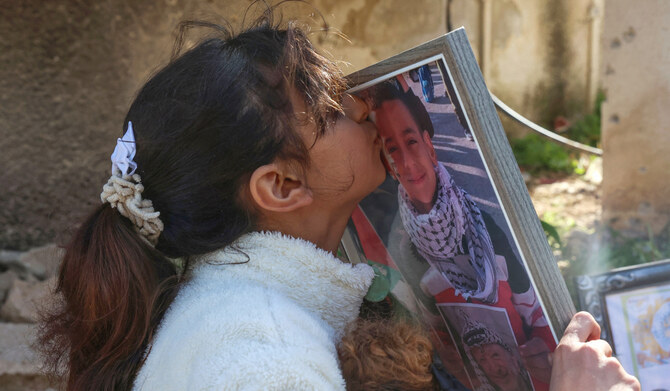TAMMUN, Plestinian Territories: Batoul Bsharat was playing with her eight-year-old brother Reda in their village in the occupied West Bank. Moments later, an Israeli drone strike killed him and two of their cousins.
“It was the first time in our lives that we played without arguing. It meant so much to me,” the 10-year-old said as she sat on the concrete ledge outside the family home in the northern village of Tammun where they had been playing on Wednesday.
At her feet, a crater no wider than two fists marked where the missile hit.
The wall behind her is pockmarked with shrapnel impacts, and streaks of blood still stain the ledge.
Besides Reda, Hamza, 10, and Adam, 23, were also killed.
The Israeli army said on Wednesday that it had struck “a terrorist cell” in Tammun but later promised an investigation into the civilian deaths.
Batoul puts on a brave face but is heartbroken at the loss of her younger brother.
“Just before he was martyred, he started kissing and hugging me,” she said.
“I miss my brother so much. He was the best thing in the world.”
Her cousin Obay, 16, brother of Adam, was the first to come out and find the bodies before Israeli soldiers came to take them away.
“I went outside and saw the three of them lying on the ground,” he said. “I tried to lift them, but the army came and didn’t allow us to get close.”
Obay said his elder brother had just returned from a pilgrimage to Makkah.
“Adam and I were like best friends. We had so many shared moments together. Now I can’t sleep,” he said, staring into the distance, bags under his eyes.
Obay said the soldiers made him lie on the ground while they searched the house and confiscated cellphones before leaving with the bodies on stretchers.
Later on Wednesday, the army returned the bodies, which were then laid to rest. On Thursday, Obay’s father, Khaireddin, and his brothers received condolences from neighbors.
Despite his pain, he said things could have been worse as the family home hosts many children.
“Usually, about six or seven kids are playing together, so if the missile had struck when they were all there, it could have been 10 children,” he said.
Khaireddin was at work at a quarry in the Jordan Valley when he heard the news. Adam had chosen to stay home and rest after his pilgrimage to Makkah.
He described his son as “an exceptional young man, respectful, well-mannered and upright,” who had “nothing to do with any resistance or armed groups.”
Khaireddin, like the rest of the Bsharat family, said he could not comprehend why his home had been targeted.
“We are a simple family, living ordinary lives. We have no affiliations with any sides or movements.”
Violence has soared in the West Bank since war broke out in Gaza with the Hamas attack of Oct. 7, 2023.
Israeli troops or settlers have killed at least 825 Palestinians in the territory, according to Health Ministry figures.
As the Israeli army has stepped up its raids on West Bank cities and refugee camps, it has also intensified its use of air strikes, which were once a rarity.
A day before the Bsharat home was hit, a similar strike had struck Tammun.
Khaireddin regrets that the army made “no apology or acknowledgment of their mistake.”
“This is the current reality — there is no accountability. Who can we turn to for justice?“






























